How Many Minutes of Yoga Should a Beginner Do? A Clear Answer
If you’re a beginner looking to start yoga, you may be wondering how long you should practice each day.
The truth is, there is no one-size-fits-all answer. The amount of time you should spend on your yoga practice depends on your goals and your current fitness level.

For those just starting out, it’s recommended to practice yoga for 20-30 minutes per day.
This may not seem like a lot, but Jane of Bikram Yoga Mornington said that it’s important to start slowly and build up your practice over time.
You can always increase the length of your practice as you become more comfortable with the poses and your body becomes stronger.
The health benefits of yoga are numerous, and practicing regularly can help improve flexibility, balance, strength, and overall well-being.
Whether you’re looking to reduce stress, increase your fitness level, or simply try something new, yoga is a great choice for beginners.
With a little dedication and patience, you can start reaping the benefits of this ancient practice in no time.
Establishing a Yoga Routine
If you’re a beginner looking to start a daily yoga practice, it’s important to establish a consistent routine. This means determining the right duration, finding the right types of yoga for beginners, and incorporating yoga into your daily life.
Determining the Right Duration
When you’re just starting out, it’s important not to overdo it. Aim for shorter sessions, such as 20-30 minutes, and gradually work your way up to longer sessions as you become more comfortable with the practice. You can also go to Bikram Yoga Mornington to have your yoga sessions.
Consistency is key, so it’s better to practice for a shorter amount of time more frequently than to practice for a longer amount of time less frequently.
Types of Yoga for Beginners
As a beginner, it’s important to find the right types of yoga that suit your needs and abilities.
Vinyasa, Ashtanga, and Power Yoga are all more physically demanding styles that may not be suitable for beginners.
Hatha Yoga, Yin Yoga, Restorative Yoga, and Iyengar Yoga are all great options for beginners as they focus on gentle movements and holding poses for longer periods of time.
Incorporating Yoga into Daily Life
Incorporating yoga into your daily life can be as simple as practicing a few poses in the morning or before bed.
You can also try attending beginner yoga classes at your local gym or yoga studio to learn proper form and technique.
It’s important to find a schedule that works for you and to stick to it. Consistency is key when it comes to establishing a daily yoga practice.
Physical and Mental Benefits of Yoga
Yoga is a holistic practice that offers a range of physical and mental benefits. With consistent practice, yoga can help improve your flexibility, strength, focus, balance, and mobility. It can also help reduce stress, improve breathing, and enhance sleep quality. In this section, we’ll explore some of the key benefits of yoga in more detail.
Improving Flexibility and Strength
One of the most well-known benefits of yoga is its ability to improve flexibility and strength.
Through a series of poses and stretches, yoga can help increase your range of motion, improve your posture, and build muscle strength.
This can be particularly beneficial for those with joint mobility issues or injuries.
Enhancing Mental Wellbeing
Yoga is also known for its ability to enhance mental wellbeing. Regular practice can help reduce anxiety and depression, improve focus and concentration, and promote a sense of calm and relaxation. This is due in part to the emphasis on breathing techniques and mindfulness in yoga practice.
Yoga for Specific Health Conditions
In addition to its general health benefits, yoga can also be used to address specific health conditions.
For example, yoga therapy has been shown to be effective in reducing chronic pain, inflammation, and stress. It can also be helpful in managing conditions such as diabetes and improving immune system function.
Overall, yoga is a versatile practice that can be tailored to suit your individual needs and goals.
Whether you’re looking to improve your physical fitness or enhance your mental wellbeing, yoga offers a range of benefits that can help you achieve your goals.
